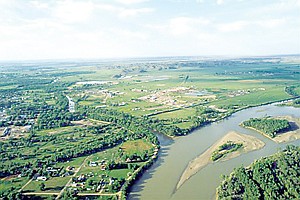Water trial opens; Wyoming criticizes
BILLINGS — Farmers and ranchers in southeastern Montana are being denied their “lifeblood” by upstream water users in Wyoming who are taking more than their share of water from the Yellowstone River basin, Montana Attorney General Tim Fox said Wednesday.
But as a weekslong trial in the interstate water dispute began, an attorney for Wyoming accused Montana of wasting enough water to more than satisfy its needs.
The trial comes more than six years after Montana sued its southern neighbor before the U.S. Supreme Court for supposed violations of the Yellowstone River Compact. That agreement governs water use in a basin that includes portions of Montana, Wyoming and North Dakota.
Wyoming Senior Assistant Attorney General James Kaste said in opening arguments that Montana irrigation managers routinely allow large volumes of water to bypass a reservoir along the states’ border.
That means water is lost when it drains from the Tongue River into the Yellowstone before it can be used for agriculture.
Montana “spills its water needlessly into the Yellowstone River, only to turn to its neighbor and demand that we foot the bill,” Kaste said.
Fox responded that the issue was a red herring, meant to divert attention from Montana’s claim that Wyoming violated a 1950 water sharing agreement.
“It’s a dodge and deflect strategy,” said Fox.
Justices appointed Stanford Law School professor Barton Thompson, Jr. to oversee the trial. It’s scheduled to last until Nov. 21 — or even longer if Thompson decides more time is needed.
The Supreme Court will have the final say in the dispute after Thompson issues his recommendations.
North Dakota also is a defendant, but there are no claims against the state.
Montana’s 2007 lawsuit also alleged Wyoming was taking too much water from a second Yellowstone tributary, the Powder River.
The state is not pursuing claims specific to the Powder River during the trial, focusing instead on the Tongue.
A 2011 Supreme Court ruling resolved another aspect of the case with a ruling that rejected claims Wyoming farmers took advantage of irrigation improvements to increase their water use.


